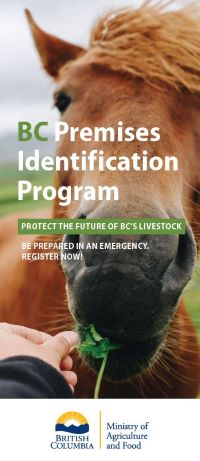Premises ID
Premises Identification (ID) is a way of linking poultry and livestock, including bees, to specific geographic locations. Premises ID information includes contact information to inform planning, and responses to animal disease events or natural disaster emergencies like floods or fires.
On this page:
- How to register
- Reconfirm account
- Who needs to register
- Animals that need to be registered
- Types of premises
On July 1, 2022, Premises ID registration became mandatory for poultry and livestock owners and commingling site operators in B.C.
- Read the news release
- Read our frequently asked questions
A premises is any parcel of land where livestock animals are kept, assembled or disposed of. Types of premises registered with the program are wide-ranging, from small-scale or hobby farms with a few animals to large commingling sites such as feedlots, auction yards and abattoirs.
Premises ID is an important tool for protecting the health and safety of your livestock and is one of the three pillars of Canada’s national livestock traceability system, along with animal identification and animal movement reporting.
In the event of an emergency affecting livestock, premises ID improves our ability to rapidly identify potentially affected premises and more effectively contain animal disease outbreaks or facilitate natural disaster response and recovery.
Beekeepers can now register their apiaries through the Premises ID program.
There is no cost to participate in the program.
How to register
or
Submit completed paper forms
By Mail:
BC Premises ID Program
1767 Angus Campbell Road
Abbotsford, BC V3G 2M3
By Email:
By Fax:
604-556-3030
Registration Resources
- Frequently Asked Questions About Premises Identification (NEW) (PDF)
- Beekeeper Frequently Asked Questions About Premises Identification (NEW) (PDF)
- Where to Find Parcel ID (PID) on a Tax Assessment (PDF)
- How to Find a B.C. Land Titles Parcel ID Using Civic Address (PDF)
Reconfirm account
Regularly updating your Premises ID information is crucial for effective emergency response. Take a moment to review and reconfirm your details, ensuring accurate and up-to-date information. Your proactive engagement plays a key role in enhancing the reliability of our response network. Thank you for your commitment to the Premises ID program and the safety of your operation.
Who needs to register?
Animal owners or individuals with animals under their care and control must obtain a Premises ID number for at least one location where their animals are regularly kept (either their property, or someone else’s property) and are encouraged to register any other locations where animals may be regularly or temporarily kept (e.g., a range tenure, temporary pasture).
Similarly, commingling site operators, e.g., boarding stable owner, abattoir operator, fairground manager, veterinary clinic, etc., must obtain a Premises ID number for the premises for which they are responsible.
Individuals or commingling site operators that are already registered with the program do not need to re-register.
Animals that need to be registered
The list of animals that must be registered under the regulation is consistent with Canada’s national livestock traceability standards and includes:
- Alpacas
- Bees
- Bison
- Cervid (e.g. farmed deer)
- Cattle
- Donkeys
- Doves
- Ducks
- Fowl (quail, peafowl, pheasants,
guinea fowl and pigeons) - Fur-bearing animals (chinchilla, fox)
- Geese
- Goats
- Horses
- Llamas
- Mules
- Poultry (broilers, pullets, layers,
turkeys, exhibition breeds) - Rabbits
- Ratites (Emu/Ostrich)
- Sheep
- Swine
(pigs, hogs, miniature pigs) - Vicuna
- Water Buffalo
- Wild boars
- Yaks
Types of premises
A premises is any parcel of land where animals, bees, plants or food are grown, kept, assembled or disposed of, and includes:
- Abattoirs
- Apiaries (beekeeping)
- Assembly yards
- Auction/Livestock sale facilities
- Community pastures
- Exhibition/fair grounds
- Farms/stables
- Feedlots
- Hatcheries
- Hobby Farms
- Insemination centres
- Race tracks/competition facilities
- Pastures
- Rendering plants
- Research facilities
- Veterinary hospitals/labs
- Zoos/petting zoos

Premises ID registration
National livestock ID and traceability
Canadian cattle producers use a world class industry-led system to identify individual animals by recording the animal's actual birth or calving date. Producers are also using this system to verify cattle ages to meet market requirements.
Contact information
Do have questions about government programs to support agriculture and seafood businesses? Contact us.
1-888-221-7141

